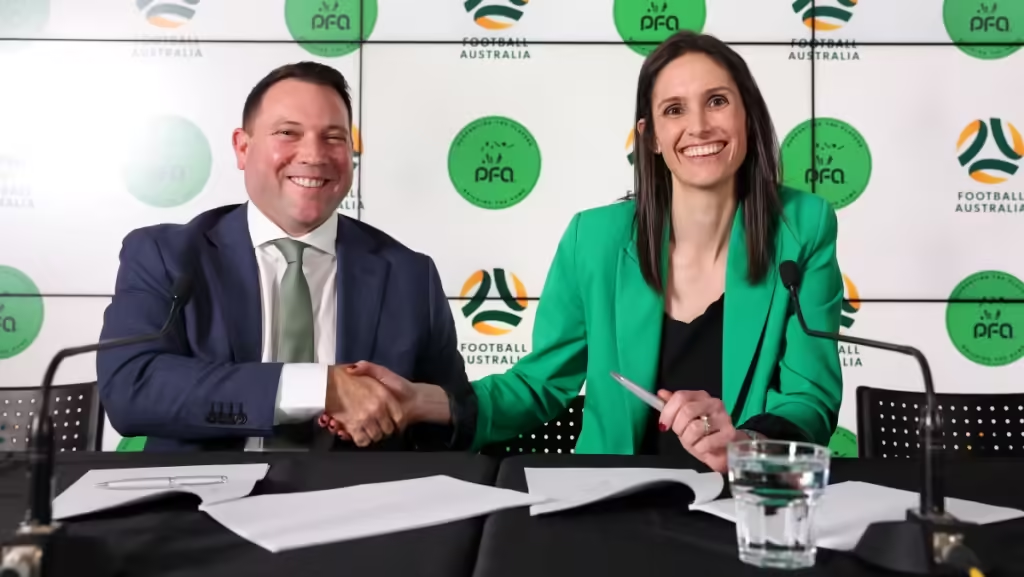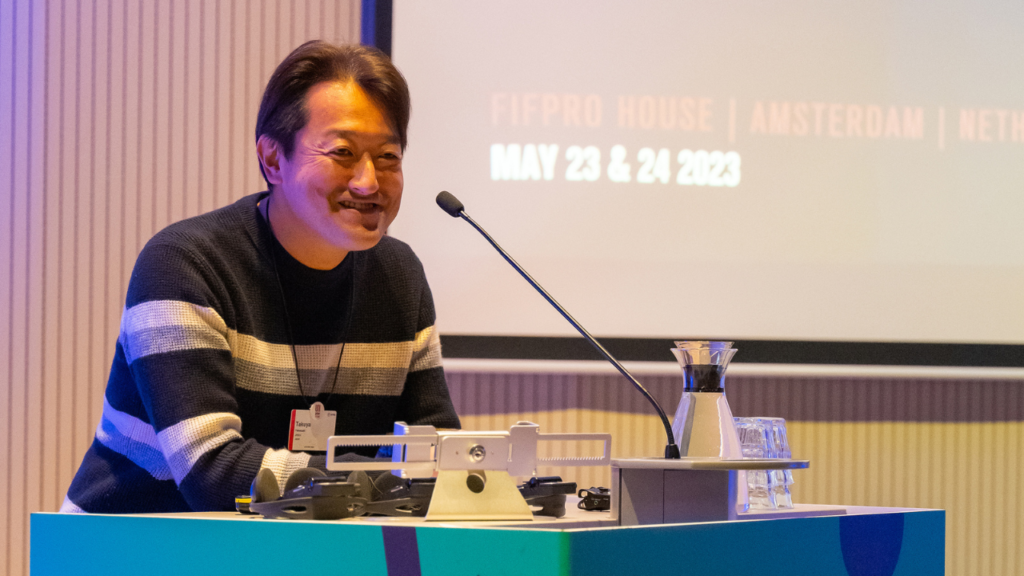
Kate Gill (right), shaking hands with Football Australia CEO, James Johnson. Photo: Provided by PFA.
The Asia/Oceania arm of FIFPRO released a scathing report on Thursday, detailing concerns about the future of the Women’s continental game in Asia, just days before the new AFC Women’s Champions League (AWCL) kicks off.
Backed by Professional Footballers Australia (PFA), the report contains the results of an anonymous survey completed by 88 participants of last season’s AFC Women’s Club Championships (AWCC).
All eight participant clubs – including Sydney FC – from the 2023/24 edition are represented in the survey. The competition acted as a precursor to the new AWCL.
The AWCC Final debacle
One of the largest criticisms of the AWCC came after the AFC decided not to complete the competition in its entirety.
After the Urawa Red Diamonds and Incheon Steel Red Angels finished top of their respective groups in November 2023, they believed they had qualified through to the Final, to be played in the new year.
However, in March of 2024, the AFC decided that no final was to be played. The official competition regulations reading: “the AFC may decide to introduce a Final and/or Knockout Stage for the participating clubs”.
After various bodies from both South Korea and Japan issued statements expressing their disappointment, and several meetings with the AFC, it was eventually decided that Urawa would host a final after all.
Urawa won the game 2-1 against the travelling Red Angels, in front of a healthy 5,271 spectators.
The report says FIFPRO staff on the ground for the match noticed a distinct absense of AFC senior executives, sponsors, or strong promotion of the match.
“Taken together, the episode gave a sense that the AFC was treating the AWCC as an operational trial rather than a serious competition,” the report continued.
“To make matters worse, it did not set this expectation for participants from the outset. Clubs and players incurred significant costs to participate in the groups and then were unexpectedly denied the opportunity to compete for prestige.
“The AFC acted unilaterally and communicated without transparency. This culture must change if these continental competitions are to succeed for all stakeholders.”
The call for more collaboration between the players and the AFC is a consistent theme, and dates back to a similar report released by FIFPRO Asia/Oceania back in February 2024, outlining concerns about the Men’s AFC Champions League.
Non-professional status
The survey also goes to outline a mismatch between the often non-professional status of female footballers, and some regulations imported without change from the Men’s AFC Champions League Elite.
Co-Chief Executive of PFA and FIFPRO Board Member, Kate Gill says the real world circumstances of these players must be considered, whilst reiterating FIFPRO’s continual call for more collaboration with the AFC.
“Whilst the potential of the women’s game in Asia is immense, we must ensure it is developed in a way that is responsive to the lived realities illustrated in this report,” she said.
“This can only occur through establishing a genuine partnership between the AFC, leagues, clubs and players, and not through unilaterally overlaying regulations that are fit for men’s competitions onto female competitions.”
The “lived realities” that Gill refers to, includes the fact that over a third of players surveyed did not consider themselves professionals, six per cent even answering ‘amateur’.
Less than half said they earned more than $10,000 USD from football annually, whilst a quarter said that football was not their primary source of income.
Whilst those numbers already provide reason for concern, the report also highlights that with the AWCL expanding to 22 teams all from different member federations, the rates of professionalism are likely to drop even further.
Less than a third said they’d received additional salary or bonuses for participating in the AWCC, 16 per cent said the competition disrupted their non-football employment, and half of players had domestic fixtures rearranged – which only goes to kick these same issues down the road.
Roughly half of A-League Women’s players have secondary jobs. Taking them away from the places that they do earn their money, only passes more difficulties onto them.
Finances
Whilst the AWCC did not award any prize money or cover travel costs, the AWCL is a significant step up in this respect.
Clubs will receive $100k for participation in the group stage, as well as $20k for each win at that stage. The winner’s purse is $1.3m and offers a tantalising prize for clubs to chase.
However, financial complaints for the new strucutre centre around the quarter-finals stage, which is the only phase of the tournament that offers the ability to host a home game, away from the centralised format of the groups and final-four.
The home team is required to cover the costs of: Five-star accommodation, vehicles, international buffet style meals, laundry and SIM cards for AFC delegations, as well as compliance with the AFC’s familiar ‘clean stadium’ policy.
“These regulatory impositions on home clubs are replicated from the men’s AFC Champions League Elite. These regulations are not fit for purpose for a women’s football landscape that still features semi-professional conditions and clubs with scarce resources compared to men’s game,” the report argues.
“It is bad optics, at least, that AFC’s delegation and match officials should be afforded five-star accommodation and all-expenses paid perks when the majority of players earn less than $10,000 from football each year.”
The regulations also contain wide punitive powers that are disproportionate to the reality of women’s football. For example, if a player does not attend a pre-match press conference, she “shall be fined at least $2,500”.
These regulations, the report argues, should be reconsidered.
What’s next?
Chair of FIFPRO Asia/Oceania, Takuya Yamazaki says the entire report illustrates the enormous challenges faced by female footballers,
“Participating in continental club competitions in Asia significantly impacts players, whether through increased workload, fixture disruption, or challenges in balancing football with other commitments,” he said.
“The tournament’s schedule and structure must consider the semi-professional status of many female players to minimise disruption and reduce, rather than compound, the financial strain these players are feeling.
“The AFC’s unilateral decision-making must change to ensure the success of continental competitions. We continue to recommend a genuine partnership between professional footballers, clubs, leagues, and the AFC, which is crucial to unlocking the potential of Asian football.”

The central recommendations of the report include higher minimum standards for players and increased visibility of the competitions, but most importantly to FIFPRO, better communication from the AFC.
Women’s football has boomed. FIFPRO and PFA have made it clear time and time again, that they believe the only way to realise its full potential, is deep collaboration between the confederation and the players themselves.
Whilst Melbourne City will have to wait until October to begin their AWCL campaign, the preliminary stage kicks off this weekend, as teams from all around the continent fight for the final four positions in the group stage.
